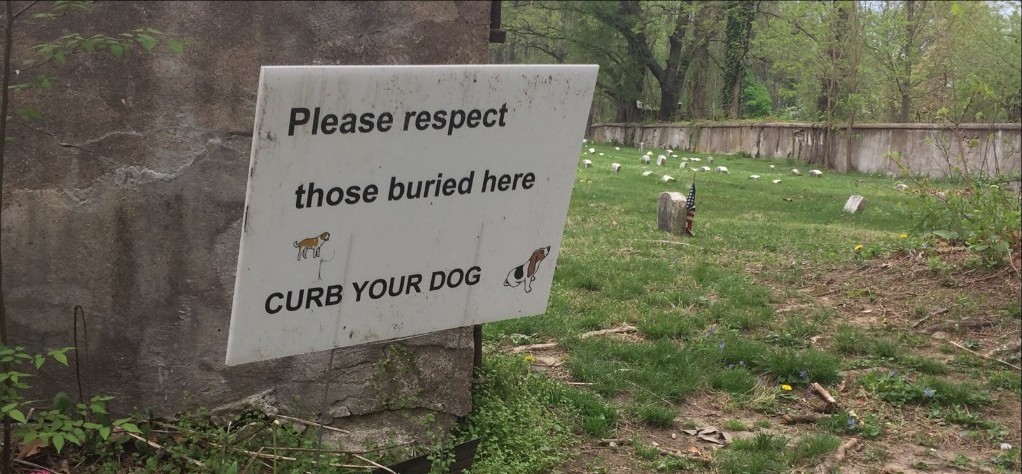The sign at the entrance to the Friends Cemetery near the Meeting House on Maple Avenue asks us to curb our dogs out of respect for those buried there. I appreciate the sentiment, but the dead don’t care.
Now, I think it’s best that we not allow our dogs to run among the graves, leap and catch Frisbees over the top of memorial stones, or do those other things dogs are prone to do when they’re running free. Out of respect for the grieving who may have come to remember a loved one – out of respect for the memory of those buried in the graveyard – it’s best that we curb our dogs. But the dead themselves? They don’t care.
In the popular imagination, the dead are very much earth bound. They flit around us in their newly given wings and robes, looking in on us, watching out for us, quite concerned that we don’t miss them too much – or too little. Eternity is tightly bound to this temporal world. We might understand why the buried ones would feel disrespected by dogs catching Frisbees over their graves.
Christian orthodoxy imagines something altogether better than babysitting our loved ones as they muck their way through life.
To be sure, the Bible gives only hints of what is to come. Without question, our bodies and our minds, attached as they now are to a three-dimensional world, can barely discern the pictures painted by the words of Scripture. For obvious reasons, we cannot map eternity on a timeline.
In his infinite kindness, though, God has given us words and images that allow us to catch a glimpse of the hope that is ours in Christ.
The confessions and catechisms of our Reformed Tradition paint pictures of what is to come. But like a Rembrandt painting or an Ansel Adams photo, the confessions and catechisms provide only a reflection, as in a mirror dimly, of a reality we can barely imagine.
Speaking of the end of time, the Heidelberg Catechism teaches us “That after this life my soul shall be immediately taken up to Christ, its Head, and that this flesh of mine, raised by the power of Christ, shall be reunited with my soul, and be conformed to the glorious body of Christ.”
For now, we are told in the Westminster Confession, “after death the bodies of human beings decompose and return to dust, but their souls, which do not die or sleep, have an immortal existence and immediately return to God who created them. The souls of the righteous are then perfected in holiness and are received into the highest heavens, where they behold the face of God in light and glory and wait for the full redemption of their bodies…Those who are alive at the last day will not die but will be changed. At that time all the dead will be raised with the very same bodies and no other than the same bodies they had before, although with different characteristics, which will be united again to their souls forever.”
The 1646 language and way of perceiving things are not wholly accessible to us, but they speak a truth that is true to us. For the believer, death ushers us into a life far better than any we have known.
The Larger Catechism describes our hope this way, “(we) will be completely and forever freed from all sin and misery, filled with unimaginable joy, and made perfectly holy and happy in body and soul, in the vast company of each other and the holy angels; (we) will be particularly blessed in the visual presence and enjoyment of God the Father, the Lord Jesus Christ, and the Holy Spirit, forever. Such is the perfect and complete fellowship the members of the invisible church will enjoy with Christ in glory at the resurrection and judgment day.”
And, yes, the confessions and the catechism, like the Scriptures, speak, too, of the very real reality of hell. But what the gospel offers is heaven.
In fact, as the Heidelberg Catechism reminds us, already we have been given a foretaste of heaven. What comfort do we find in our hope? “That since I now feel in my heart the beginning of eternal joy, I shall possess, after this life, perfect blessedness, which no eye has seen, nor ear heard, nor the heart of man conceived, and thereby praise God forever.”
Have you felt in your heart the beginning of eternal joy? I think I have.
Dogs in the cemetery? Curb them for the sake of the living. As for the dead, they don’t care.
See you Sunday

